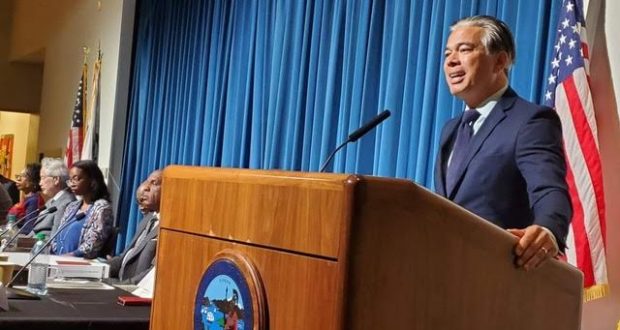By Antonio Ray Harvey | California Black Media
Last week, California Attorney General Rob Bonta’s office released data that established which demonstrated a connection between domestic violence and gun violence, and highlighted the risks women face in abusive relationships.
The California Partnership to End Domestic Violence (CPEDV), reports that women being abused by male partners who own guns are five times more likely to be murdered by their abusive partners. From 2013 to 2022, women accounted for 83% of victims killed in domestic violence-related gun homicides by a current or former intimate partner.
“The data is clear. People who commit domestic violence and abuse, they simply should not have firearms,” Bonta said during a news conference on Nov. 6, at the office of WEAVE in Sacramento’s Midtown. WEAVE is the primary provider of crisis intervention services for survivors of domestic violence and sexual assault in Sacramento County.
The California Department of Justice “Domestic Violence Involving Firearms in California” report explores the effect of firearm-related domestic violence incidents involving firearms throughout California. It covers the state’s long-term progress in reducing domestic violence involving firearms, the significant increases since the start of the COVID-19 pandemic, the large differences among counties across the state, and the impacts on different populations based on victims’ reported sex, age, and race or ethnicity.
The report broadly defines “domestic violence” to include both family-related and intimate partner-related violence, which may occur in “public as well as private spaces.” The data indicates that the state’s efforts have helped significantly reduce the incidence of domestic violence, especially incidents involving firearms.
California’s population grew from 31,274,928 in 1993 to 39,437,610 in 2019, a 26% increase. Correspondingly, on a per capita basis, from 1993 to 2019, California law enforcement agencies reported a 53% reduction in domestic violence-related homicides and a 61% reduction in domestic violence-related gun homicides.
Researchers estimate that about 4.5 million women alive today have been threatened by an inmate partner with a gun and that nearly one million have been shot, shot at, or had a gun used against them by an inmate partner.
The report highlights that there are significant differences across California communities in rates of reported domestic violence involving firearms. Los Angeles County, for example, recorded 184,956 domestic violence calls between 2018 and 2022, with 2,908 calls involving firearms.
In addition, the counties of Alameda reported 27,482 calls (265 involving firearms), San Francisco had 16,509 (105), Sacramento reported 24,752 (247), Riverside 34,464 (212), and San Diego listed 88,497 calls (523 involving firearms) during the four-year span.
“Violence is not an accident. It is also not inevitable, and it can be prevented. Removing dangerous weapons from people who pose a danger to others is key to that goal,” Bonta stated. “This report gives an in-depth look at the ties between domestic violence and firearms, shining a light on the problem at hand, and illuminating the path to safety before us.”
Recognizing the dangerous connection between domestic violence and gun violence, California has adopted and invested in policies that enhance safety for survivors and the community, the report states.
Bonta launched the Department of Justice’s Office of Gun Violence Prevention (OGVP) in 2022 with the mission of supporting data-driven and impact-driven efforts to prevent gun violence and related traumas.
From 2013 to 2022, California law enforcement agencies reported 1,254-gun homicides where the suspected offenders were identified as a current or former intimate partner or family member of the victim, based on the OGVP’s analysis of victims’ race and ethnicity.
A majority (38%) of these domestic violence gun homicide victims in California were identified as non-Hispanic White, followed closely by Hispanic victims (33%). However, Black victims (13%) were disproportionately represented among adult female, male, and minor victims of domestic violence gun homicides. The Black population of California accounts for about 5.7% of the state’s population of nearly 40 million people.
“Survivors deserve to begin their pathway to healing with laws that promote their safety. We refuse to leave domestic violence survivors and communities behind — especially Black and Native women who disproportionately feel the impacts of gun violence,” stated Rocci Jackson, Gun Violence Restraining Order Community Analyst at the CPEDV.
Bonta held the news conference one day before the U.S. Supreme Court began hearing arguments in the U.S. v. Rahimi, a case involving a Second Amendment challenge to a federal law disarming individuals subject to certain Domestic Violence Restraining Orders (DVROs).
The report highlights California’s efforts to empower and protect survivors by providing a range of support services, offering crisis intervention and safety planning options, providing DVROs, and enforcing laws to protect against gun violence.
Bonta urges the SCOTUS to reverse a decision that would endanger domestic violence victims and allow firearms to remain in the hands of their abusers. The Fifth Circuit vacated the criminal conviction of a defendant who had possessed a firearm while subject to a DVRO, which a state court in Texas issued against him after finding he had assaulted his ex-girlfriend.
The U.S. Court of Appeals for the Fifth Circuit’s decision in U.S. v. Rahimi would, Bonta expressed, invalidate a federal law that prohibits adjudicated domestic abusers subject to DVROs from possessing firearms.
On August 22, 2023, Bonta joined a coalition of 25 attorneys general in filing an amicus brief in the case, urging the Supreme Court to strike down the Fifth Court’s decision and reaffirming California’s commitment to preventing gun violence through protective orders such as DVROs.
“No one should ever fear becoming a victim of gun violence, let alone at the hands of an abusive partner or loved one.,” Bonta stated. “Violent perpetrators like Zackey Rahimi have demonstrated their risk to public safety and have no business possessing a firearm. Removing dangerous weapons from people who pose a danger to others is key to protecting both survivors and the broader community.”
 Westside Story Newspaper – Online The News of The Empire – Sharing the Quest for Excellence
Westside Story Newspaper – Online The News of The Empire – Sharing the Quest for Excellence





